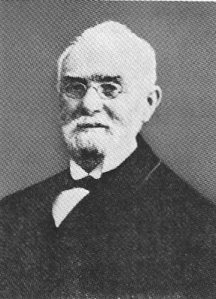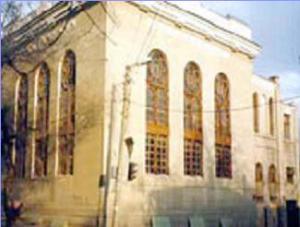Eliezer Mordechai ben Yitschak Gerowitsch was born in Kitaigorod, province of Kiev, Russia, in 1844. His childhood was spent like that of all other Jewish children, in perfecting his Jewish education and knowledge. He secured this in various Yeshivoth. This deep Jewish knowledge which he acquired during his childhood contributed much toward his development as a synagogue musician in later years.
Already during his early childhood he showed musical talent, but the poor circumstances of his family made it impossible for him to develop this musical urge. At the age of 18 he went to the city of Berditchev, in those days a stronghold of Hazanuth, to study music, where he managed to study harmony and to develop his beautiful tenor voice. His voice teacher was the then well known cantor Moses Spitzberg, chief cantor of the new Chor-Shul in that city. In time, Spitzberg secured for him the post of assistant cantor in his synagogue. Here he had the opportunity of becoming acquainted with the classical repertoire of synagogue music, which in tho days comprised the works of Sulzer, Lewandowski, Naumbourg and Weintraub. He later became chief cantor the city of Nicolaiev, where his talent as a cantor and composer of synagogue musk unfolded rapidly.
His thirst for more advanced musical education moved him to leave this post and proceed to St. Petersburg which was not only the political capital of Russia, but also one of the musical capitals of that country, sharing its splendor with Moscow. He entered the great conservatory in that city and studied voice and the higher the theoretic subjects. It was here that he made the acquaintance of Rimsky-Korsakov with whom he was later to carry on a correspondence on the subject of synagogue music and its relationship to the music of the Greek Catholic Church.
When the St. Petersburg Chor-Shul post became vacant, he was called to it. The damp climate in this city however, did not agree with him, so that he gladly accepted the call to the vacant post in the Chor-Shul Rostov on the Don River. This was further south and much more suited to his physical needs.
In this place the real Gerowitsch flourished. He composed his two collections, comprising six volumes synagogue music, three under the title of “Shire T’filoh” and three under the title of “Shire Zimroh.”
“I see lately that you demand a new kind of singing in our synagogue. Evidently, my strict, truly sacred style the stately and noble order established by me in our musical service does not seem to you entertaining enough. You think that my style is old and the style of the new cantors and composers is more becoming to our elegant new Shul. . . the cheap tunes of our young cantors, I have heard long ago.”My noble recitatives are the true synagogal song. Of course our western cantors also cultivate this style, but they have edited and arranged our old musical tradition in such a way that nothing Jewish was left of it. .. For God’s sake please do not destroy my labors of 27 years.” (Music of the Ghetto and the Bible: Saminsky, pg. 184-5.)The ideas expressed here are the true Gerowitsch. He strove to restore the true Jewish physiognomy of the nussach hat’filah, which was westernized by Sulzer and Lewandowski, and in which task he succeeded to a very great extent. In his works we have the nussah whether given to the cantor or to the choir, written in such pliable manner as to reveal at once its true spirit to the reader. He not only gives the chant to the cantor, but frequently in his works gives it to the choir to be sung in unison, thus retaining vestiges of what the chant might have sounded like in the synagogue of yesterday. But always the arrangement is done in fine taste. Always the harmony, frequently modal, is used in such a way as not to disturb the line of tradition.
This was new in those days. And it evidently met with the opposition of those who wanted to sing the liturgy to music of Handel and Verdi as was the vogue in that period.
Gerowitsch won the respect of all intelligent musicians, both Jews and gentiles. Archengelski, the great Russian church composer, the Armenian Archbishop Kevork, Deacon Sytchov, music director of the Russia Orthodox archbishopric, held Gerowitsch in great esteem, as did also the informed and intelligent of the Jewish musicians and laiety.
He died on the 8th of October, 1914 in Rostov, respected by the entire community for his character an accomplishments.


